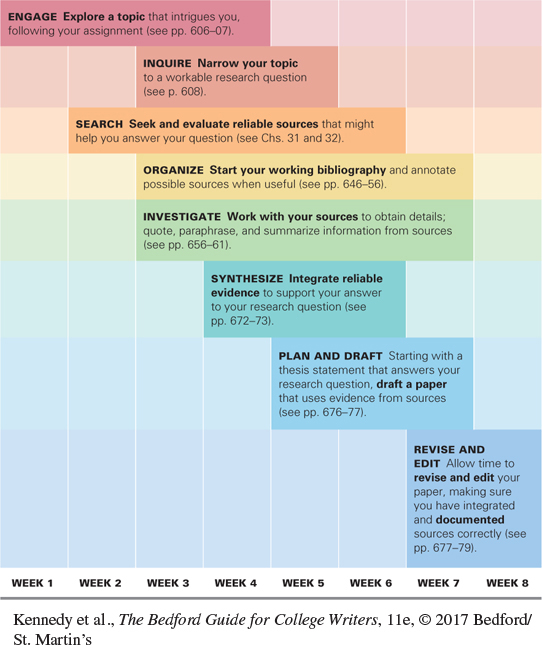Instructor's Notes
To download handouts of the Learning by Doing activities, Take Action charts, and checklists that appear in this unit, and to access lecture slides, teaching tips, and Instructor's Manual materials, go to the "Instructor Resources" folder at the end of this unit.
Introduction to Chapter 30
30
Defining Your Research Project
The graphic below identifies the major stages in a large and complex research process. Understanding your assignment will help you determine which parts of the research process you will need to engage in. For example, smaller projects like proposals or annotated bibliographies will probably not require as much planning and drafting as a full research paper. Whatever stages of the research process your project involves, keep in mind that research is a recursive process, meaning that you’ll likely need to move back and forth through at least some of the stages as you progress.
The Research Process

Why Defining a Research Project Matters
In a College Course
You have several small research assignments due, including a research proposal and a source evaluation, in your writing class.
You apply your planning experience to your capstone research project for your major.
In the Workplace
You organize your work group to investigate a potential client base, using available demographic data.
In Your Community
You arrange the needs assessment necessary to justify a new recreation center.
 When have you planned a research project? In what situations do you expect to do so again?
When have you planned a research project? In what situations do you expect to do so again?
Learning by Doing Reflecting on Research
Learning by Doing Reflecting on Research
Reflecting on Research
Reflect on your research experience. Have you ever written a research paper? Do you feel confident that you can handle a college research assignment? Or does even the word research make you feel anxious? Sum up your past experience. Then list the skills you’ve already developed in this class that might help you begin your current research project.